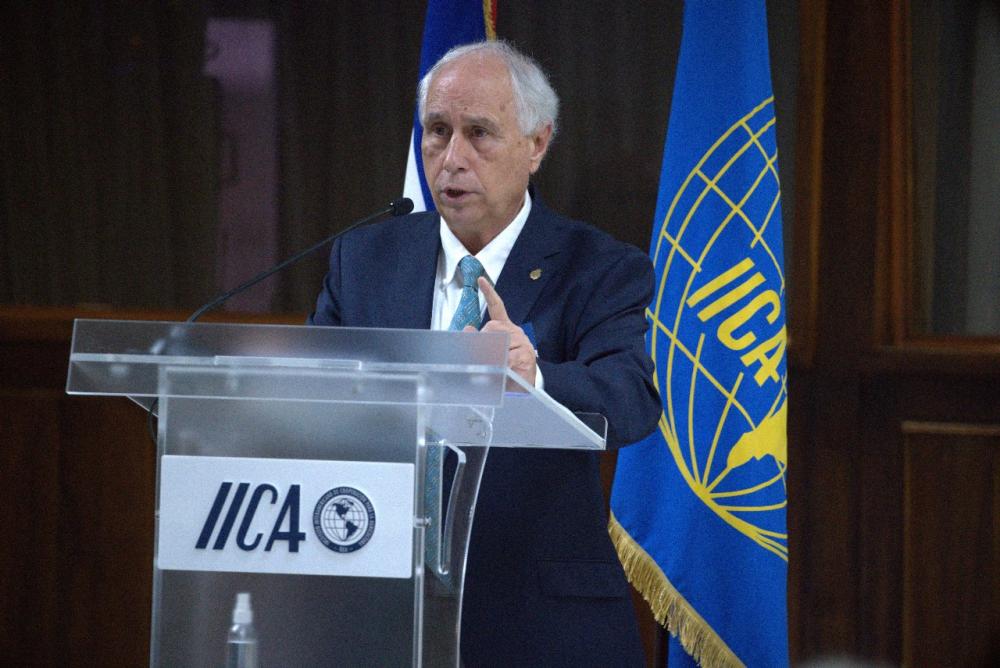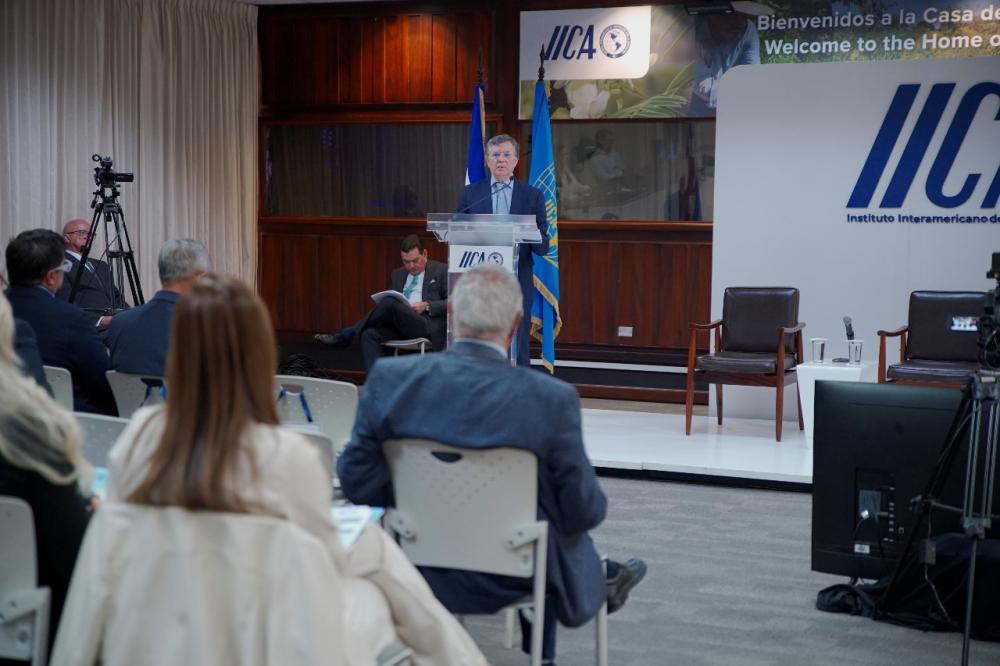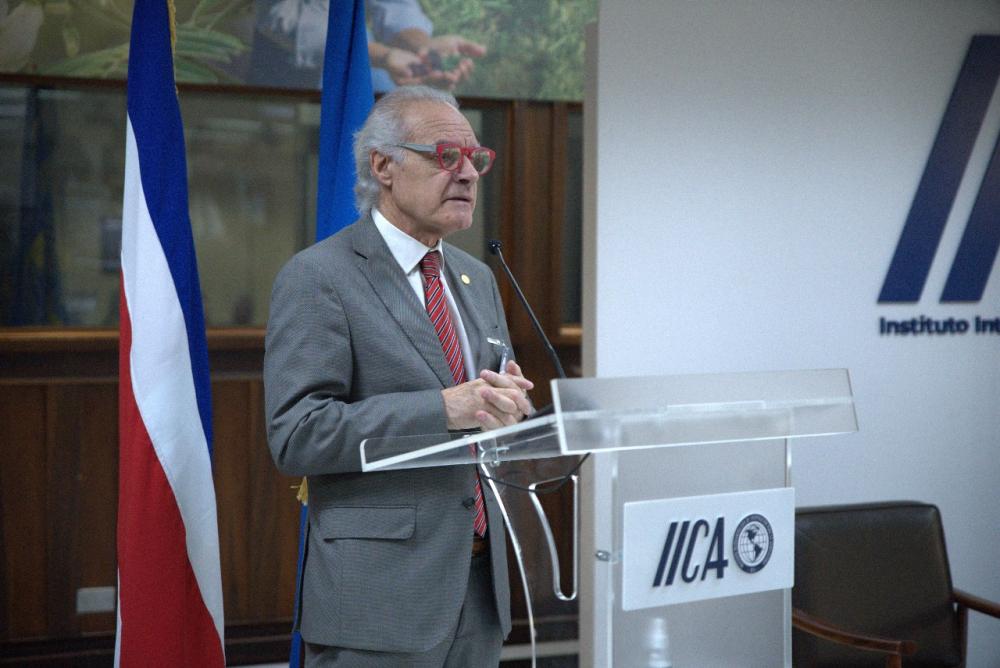The name of the event is “Challenges of Antimicrobial Resistance (AMR) under the One Health Approach” and incorporates the experiences of different countries focused on antimicrobial resistance.

San José, 16 July 2024 (IICA) – The most prominent veterinary science academics from Ibero-American countries met at the headquarters of the Inter-American Institute for Cooperation on Agriculture (IICA) in an unprecedented meeting, where they warned that good practices in agricultural activities are crucial for human health, animal health, and environmental conservation.
With the One Health approach, which calls for an integrated and unified consideration of the health of living beings and ecosystems, the Ibero-American Association of Academies of Veterinary Sciences (AIACIVET) is holding a congress in San José, Costa Rica that will feature two days of knowledge exchange and debates.
The event, which will conclude with a declaration of intent for joint and coordinated work between the AIACIVET member academies and other participating institutions, included opening remarks by Arturo Anadón, Permanent Secretary General of the Association, along with IICA Director General Manuel Otero.
Anadón noted that veterinary science academies “represent the values of excellence and independence, as they are centers or institutions of thought, culture, and advanced, free research that shed light on the complex problems of our time. Academia is not just about universities or private research centers, but rather entities that promote research and the transfer and exchange of knowledge.”
“Academia,” he added, “must always be a place for dialogue and free speech without fear of disagreement. A space to speak and listen to different voices, even those who think differently. Harmony is reinforced with ideas and words and not with silence.”
Anadón thanked IICA for hosting the meeting and valued the institution’s long-standing role as a platform for such events. He specified that AIACIVET includes the Royal Academy of Veterinary Sciences of Spain, the Peruvian Academy of Veterinary Sciences, the Colombian Academy of Veterinary Sciences, the Mexican Veterinary Academy, the National Veterinary Academy of the Oriental Republic of Uruguay, the National Academy of Agronomy and Veterinary of the Argentine Republic, the Cuban Veterinary Scientific Council Association, and the Mexican Academy of Veterinary Surgery.

“This seminar will allow us to work more closely together—academia, international organizations, and official services—to listen, propose, and then act, as the countries we serve are waiting,” said Manuel Otero.
“One of the characteristics of the current scenario is that there is no more time to waste; we must act now, and the only way to act is through networks and platforms, in projects where we agree on a concrete roadmap. We need to focus on how we move forward and work to improve people’s quality of life,” stated the IICA Director General.
The meeting includes special guests from universities and centers of excellence committed to the topic and representatives from international organizations and governments, participating both in person and virtually.
The name of the event is “Challenges of Antimicrobial Resistance (AMR) under the One Health Approach” and incorporates the experiences of different countries focused on antimicrobial resistance.
Although the One Health approach dates back to the origins of medicine, it has been adopted and promoted by the World Health Organization (WHO) at the beginning of this century. This perspective uses the close and interdependent links between the health of people, animals, and the environment to establish new methods of disease surveillance and control.
In this regard, Jorge Errecalde, President of the National Academy of Agronomy and Veterinary Sciences of the Argentine Republic (ANAV), gave a keynote presentation entitled “One Health and Microbial Resistance: A New Way of Working,” where he noted that the inappropriate use of antibiotics in medicine, agriculture, and aquaculture has been associated with health emergencies throughout history.
“We live immersed in a sea of microorganisms, which circulate more freely than money. There are no borders for these living beings,” warned Errecalde.

The expert pointed out that rural populations are among the most exposed to microbial resistance due to their contact with the environment. He stressed that good agricultural practices are essential when using genetically modified organisms and applying fertilizers and pesticides, and underscored the importance of adequate treatment of agricultural effluents.
“The quality of the food consumed by the population begins with primary production. Hygiene must be ensured throughout the chain and good manufacturing practices guaranteed,” he stated.
Natural antibiotics have existed for billions of years and have served as defenses and even signals. Today, genes are developing resistance due to the indiscriminate use of antibiotics, said Errecalde. He also pointed out that water treatment plants often do not remove resistant bacteria, which are then transferred to food.
“Antimicrobials should be used as little as possible, but as much as necessary,” Errecalde emphasized, particularly addressing the problems in developing countries, which often lack investment in infrastructure and trained personnel, resulting in decreased productivity when antibiotic use is reduced. “Antimicrobial pressure in developing countries must be gradual, as it can affect food security,” he warned.
Elías Barquero from the National University of Costa Rica and Heylin Fernández from Costa Rica’s National Animal Health Service (SENASA) shared the Central American country’s experience in identifying and studying bacterial agents that cause diseases in livestock.
Lisette Lapierre from the University of Chile and Tania Herrera from the Chilean Ministry of Health discussed the steps taken by the Andean nation, where the national antimicrobial resistance plan is a public policy with academic collaboration.
Gabriel Gutkind from the National Academy of Pharmacy and Biochemistry and Jorge Neira from the National Academy of Medicine of Argentina addressed, among other topics, the relationship between soil degradation, a widespread problem in the Americas, and human health.
Diódoro Batalla from the Mexican Veterinary Academy spoke about actions being taken in Mexico to combat microbial dissemination through food, particularly of animal origin. Iang Rondón Barragán from the Colombian Academy of Veterinary Sciences highlighted the need to develop protocols and unify minimum criteria for animals.
More information:
Institutional Communication Division.
comunicacion.institucional@iica.int











